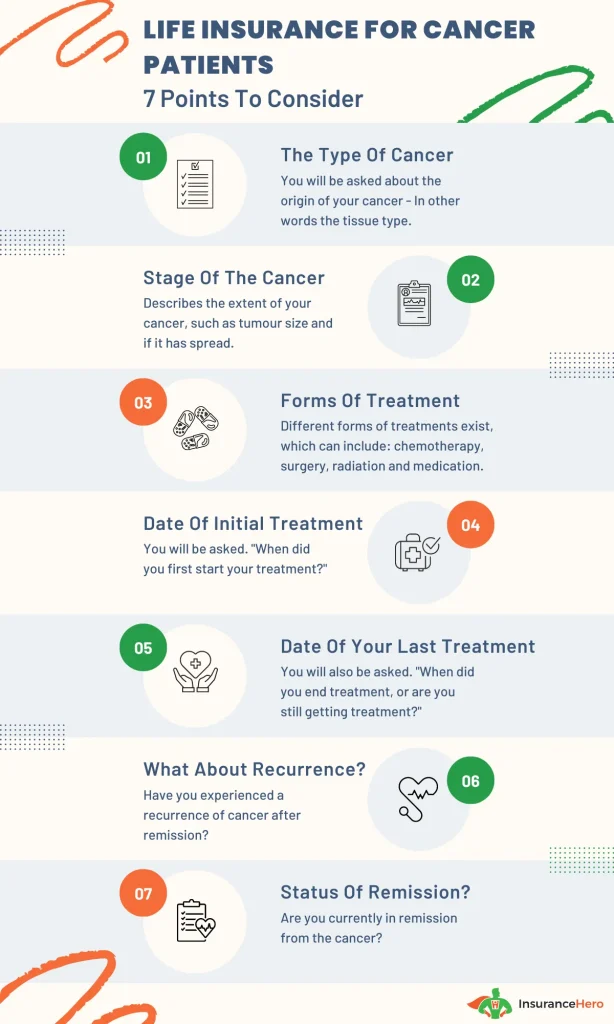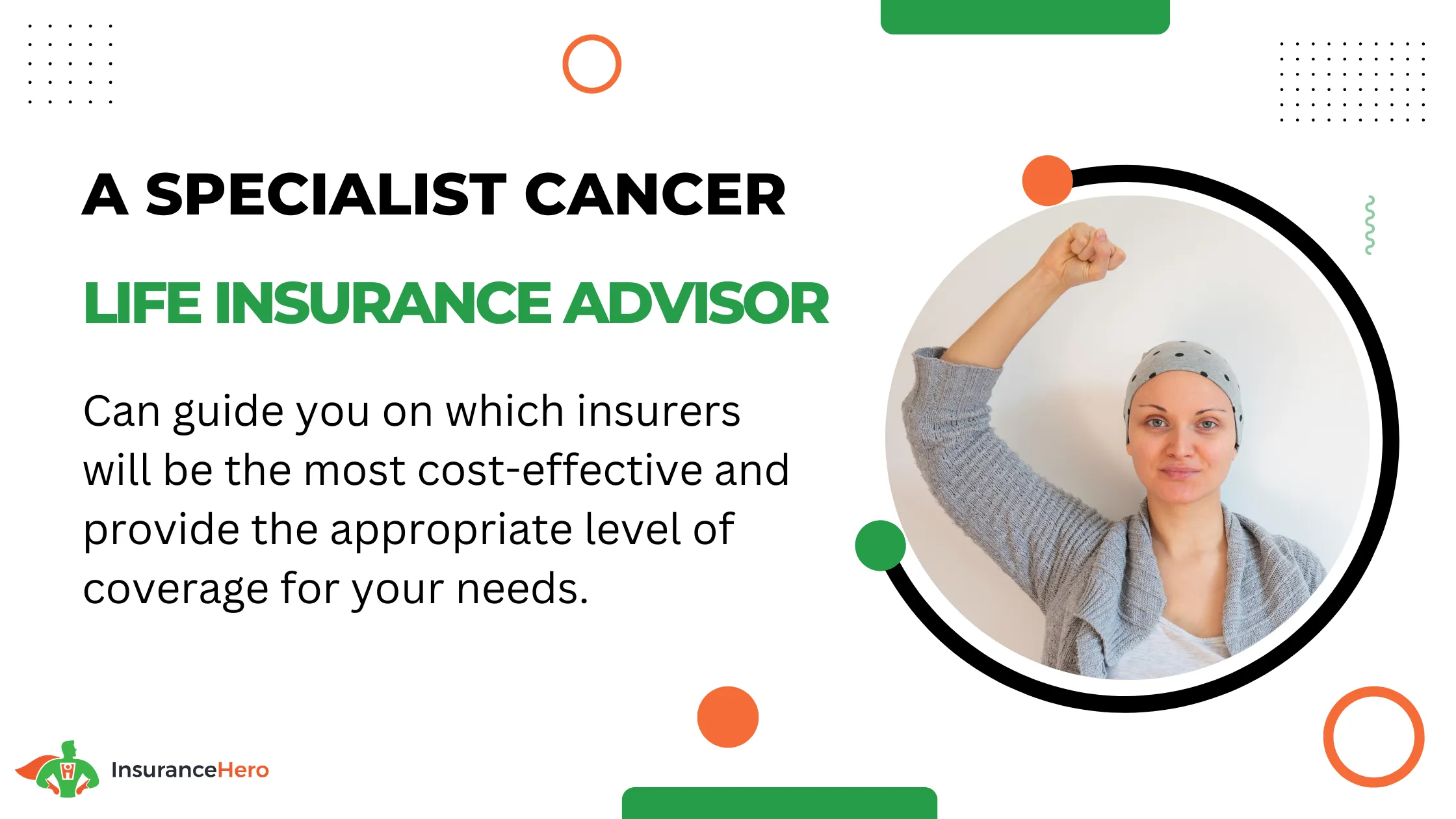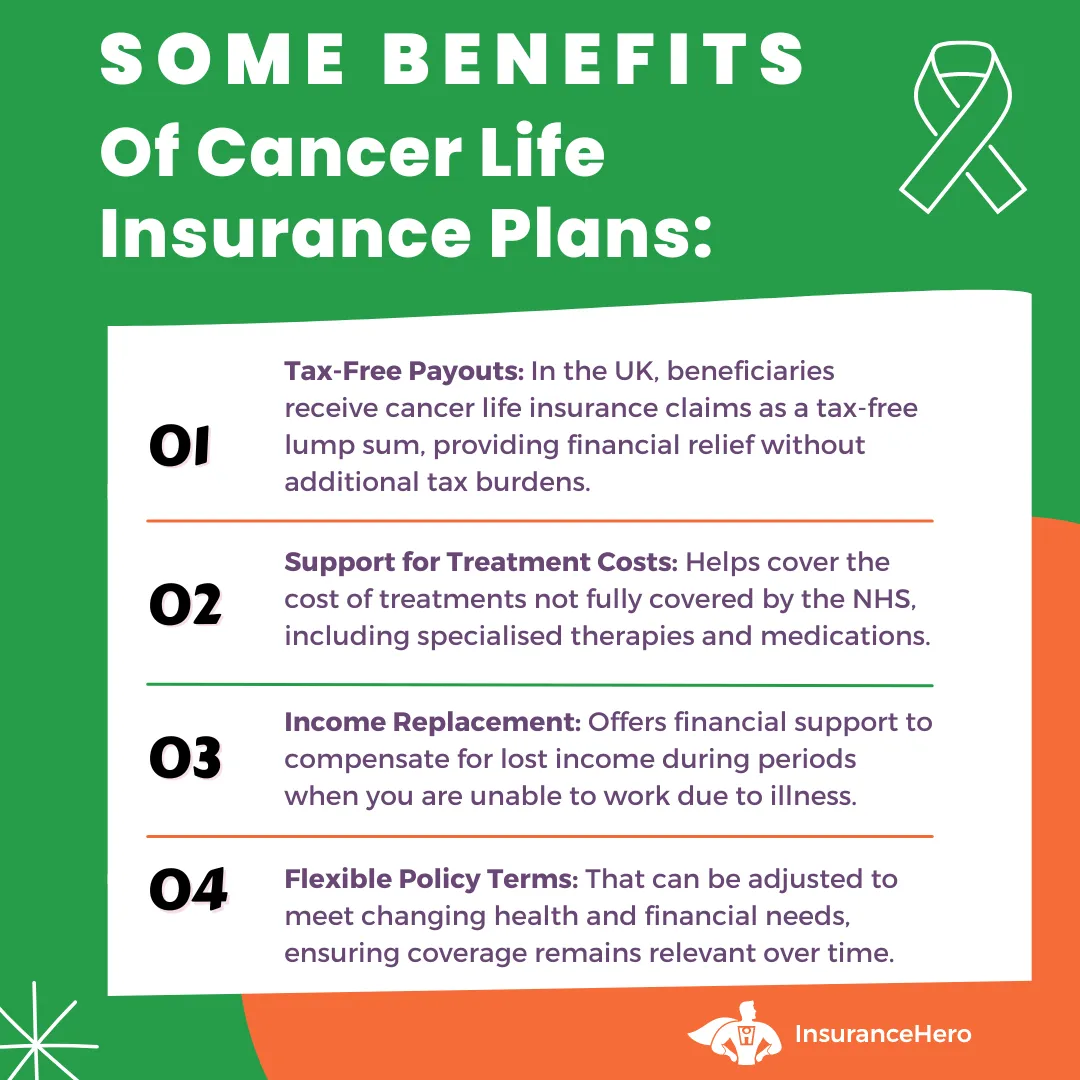Best Cancer Life Insurance And Critical Illness Quotes

When a medical tragedy strikes, knowing there is financial support for you and your family can bring a lot of relief to everyone involved.
Cancer is not an easy topic to discuss. Still, the statistics surrounding this devastating illness make cancer insurance worth serious consideration when considering a life insurance policy and critical illness coverage.
Adding cancer life insurance to your insurance coverage portfolio can help protect you and your family’s financial future and aid with the high cost of medical bills associated with this illness.
This type of protection can allow the policyholder and his or her family to focus on recovery rather than financial issues.
Cancer Life Insurance In Summary:
Securing life insurance with a cancer diagnosis is a financially wise decision to protect your loved ones during uncertain times.
Insurance Hero can help you find the most comprehensive and cost-effective policies.
Here’s why it’s worth considering:
- Comprehensive Coverage: Despite a cancer diagnosis or family history, options such as guaranteed life insurance and personal accident insurance offer immediate financial protection for your family, with some policies not requiring medical questions.
- Cost-effective Peace of Mind: Policies tailored to cancer survivors’ financial capabilities debunk the misconception that life insurance is unaffordable post-cancer, making it an accessible support option.
- Expert Guidance Available: Specialised cancer life insurance advisors provide invaluable insights, helping to grasp the complexities of insurance options and secure the best rates from compassionate insurers who understand your journey.
- Long-term Financial Security: As post-treatment progresses, life insurance becomes more attainable and affordable. It ensures that your loved ones are financially safeguarded long-term, making it a prudent step in managing life’s uncertainties.
Many options are available regarding cancer insurance, and Insurance Hero is here to help you find a policy that best fits your unique needs.
Compare The Leading Cancer Life Insurance Companies. Get The Best Deal – 60 Sec Form


Important Information Regarding Cancer Life Insurance
Does life insurance cover cancer? Generally, critical illness policies that include cancer life insurance will cover individuals up to age 70 or 75, while selected plans will even cover individuals up to age 85.
When thinking about purchasing this kind of insurance, it is important to remember that almost 10 percent of all new cancer diagnoses occur before the age of 50, and almost 55 percent of new cases occur before the age of 75.
Researching and purchasing this policy early on may be a great decision based on these statistics.
Premiums associated with cancer life insurance generally increase over time, so purchasing this type of coverage early can help lock in lower rates.
If you already carry cancer insurance, it is also important to review the types and stages of cancer that will be covered.
Critical illness and cancer coverage can change with ever-improving advances in screening and treating this disease. Some policies may even become outdated as this disease is diagnosed and treated in much earlier stages than previously.
What Conditions are Covered Under Cancer Life Insurance?
The two most commonly diagnosed forms of cancer are prostate cancer and breast cancer. These two forms of cancer are generally covered under most cancer insurance and critical illness cover policies.
Most policies also offer additional coverage for the earlier stages of these particular diseases.
Breast cancer accounts for approximately 30 percent of all cancer diagnoses in women in the United Kingdom, while prostate cancer accounts for approximately 25 percent of all cancer incidents in men.
Recent changes in cancer insurance now cover additional procedures to reflect the changes in medical screening and diagnosis. Previously, coverage for surgeries for women was limited only to mastectomies, whereas recent coverage now supports any number of different procedures.
Also, cancer life insurance issued by several providers now covers lower-grade prostate cancer for men. These coverage changes help insurers stay updated with the latest advances in the medical field. Most types of skin cancers are also covered.
Not All Policies Are Created Equal
Although cancer is considered a core critical illness under most critical illness cover policies, not every policy covers less advanced forms of this disease.
Because of this, it is important to thoroughly research any cancer insurance policy and ensure it meets all your coverage needs. The Association of British Insurers, or ABI, defines cancer as “any malignant tumour diagnosed as positive and characterised by the growth of malignant cells and tissue invasion.”
This definition applies to illnesses such as sarcoma, leukaemia, and lymphoma.
Because of how the ABI defines cancer, some policies may not include coverage for conditions such as pre-malignant tumours, non-invasive tissue, borderline malignancy, low-grade prostate cancer, early stages of breast cancer and several other circumstances.
Review any cancer insurance policy and fully understand which diagnoses may not be covered.
A cancer diagnosis can be a devastating shock to any individual and his or her loved ones.
Although no amount of planning can prepare a family for dealing with this terrible disease, purchasing critical illness cover with cancer insurance can help those, including women, who are suffering from cancer. As a result, their families have one less thing to worry about.
Cancer life insurance can be tremendously helpful in managing high medical expenses, and choosing a policy that fits your needs can only further ease a policyholder’s mind.
Life insurance with pre-existing medical conditions is also available through the Insurance Hero team.

What Happens With Life Insurance If You Are Diagnosed With Cancer?
If you are diagnosed with cancer, you should first check if your life insurance policy covers it. If you have critical illness coverage, you can receive funds to cover the costs of therapy, needed equipment, or living expenses while you cannot work (only if your diagnosis is included in your policy).
You can also count on a payout when diagnosed with a terminal illness. If you have terminal illness cover and received a diagnosis with a life expectancy of fewer than 12 months, you can claim this.
However, it’s important to know that specific requirements must be met. For example, you must pay your premiums throughout the policy term. If you have any inconsistencies, you might not be eligible for the payout.
If you receive a cancer diagnosis during the life insurance policy term, check if you are insured and what requirements you need to meet to benefit from the coverage.
Cancer patients can benefit from coverage, as life insurance providers are obligated to fulfil the terms of the policy, even if they get ill during its term. The only exception is individuals who lie about their medical history during the life insurance application process.
Can I Get Life Insurance 5 Years After Cancer?
Many insurance providers can offer you a traditional life cover if you’ve been in remission for five years. The longer you’ve been in remission, the easier it should be for you to qualify for various life insurance policies.
But it’s not the only factor a life insurance company will consider when conducting your application process.
Other important aspects that will determine whether or not you can purchase a cover are:
- the type of cancer you had,
- the severity of the illness,
- the length of time during which you were receiving treatment.
All of these will be discussed during your application process when the insurer asks you about your medical history.
Additionally, you may be asked about the recurrence of the disease, your family history of the disease, as well as if the cancer was surgically removed or not.
Your age, history of other illnesses and pre-existing medical conditions, and additional risk factors, like whether or not you smoke, will also influence the insurance company’s decision.
Generally, you have to be at least one year into remission to qualify for most life insurance policies, and still, you may get rejected, depending on what type of cancer you had. It’s also expected that your life insurance premiums will be higher.
Moreover, many life insurance providers won’t offer their policies to cancer survivors with less than three years of remission.
Contact us if you’re unsure whether you can apply for life insurance as a cancer survivor. At Insurance Hero, we can help you find the best cancer insurance in the UK.
| Key Points | Details |
|---|---|
| Importance of Cancer Life Insurance | Cancer insurance provides financial support during a medical tragedy, helping families focus on recovery rather than financial issues. |
| Cancer Statistics | Almost 10% of all new cancer diagnoses occur before age 50, and 55% before age 75. Early insurance can lock in lower rates. |
| Types of Cancers Covered | Most policies cover prostate and breast cancer, with recent changes reflecting advances in medical screening and diagnosis. |
| Policy Variations | Not all policies cover less advanced forms of cancer. It’s crucial to understand which diagnoses may or may not be covered. |
| Impact of Cancer Diagnosis on Existing Life Insurance | Life insurance provides peace of mind during challenging times. Even with higher premiums, securing a policy can benefit the family’s future. |
| Life Insurance Post-Cancer | Many providers offer traditional life cover to individuals in remission for five years. Factors considered include type of cancer, severity, treatment duration, and other health conditions. |
| Types of Policies for Cancer Patients | Options include Terminal Illness Cover, Cancer Critical Illness Cover, Term Life Insurance, and Over 50s Life Insurance Policy. |
| Value of Cancer Patient Life Insurance | Life insurance provides peace of mind during challenging times. Even with higher premiums, securing a policy can be beneficial for the family’s future. |
| Recommendation | It’s advised to secure critical illness or terminal illness coverage early. Insurance Hero can assist in finding the best policy for cancer patients. |
What should I do if I’ve been declined life insurance because of cancer in the past?
Suppose your application for life insurance was previously rejected due to a cancer diagnosis.
In that case, there are several steps you can take to enhance your chances of obtaining coverage in the future:
- Wait the Appropriate Time: Insurance companies often require a period to elapse after cancer treatment before considering an applicant for coverage. This typically spans about two years, but it varies depending on the insurer and the specifics of the disease and treatment. Ensure you have passed this threshold before applying again.
- Select the Right Insurer: Some insurers are more accommodating than others regarding insuring individuals with pre-existing conditions, including cancer. It’s beneficial to research or consult with a specialist like Insurance Hero, who understands the landscape of life insurance for cancer survivors and can guide you towards companies with more lenient policies regarding past cancer diagnoses.
- Don’t Disclose Previous Declines: When applying for new coverage, remember that insurers typically do not have access to information about your previous applications unless you disclose it. Unless specifically asked, there’s no need to mention that you have been declined before.
- Stay Persistent: Do not be discouraged by a past rejection. Insurance policies and their criteria can change, and your health circumstances might evolve to make you a more favourable candidate.
By taking these careful and informed steps, you can significantly increase your chances of successfully obtaining life insurance even with a history of cancer.

What are the different types of cancer according to Cancer Research UK?
Cancer Research UK details a comprehensive list of cancer types, organized alphabetically. This includes various forms of leukaemia, such as Acute lymphoblastic and Acute myeloid, and tumours affecting different organs like adrenal glands and anal cancer.
Disorders like Barrett’s Oesophagus and Basal cell carcinoma are also mentioned, along with common cancers like bladder, breast, and bone cancers.
Additionally, the list includes cancers that have metastasized to other parts of the body, such as bone, brain, liver, and lung. Various specific cancers like cervical, colorectal, and those affecting children are also referenced, along with rarer types such as ear, endometrial, and eye cancer.
Gastrointestinal cancers are covered extensively, including those affecting the gallbladder, gastric system, and gastrointestinal junction. Other types, like Hodgkin lymphoma, head and neck cancers, specific sarcomas like Kaposi’s, and conditions like hairy cell leukaemia, are highlighted.
Cancers of the kidney, larynx, liver, and lung, including primary and neuroendocrine tumours, are listed.
The skin cancers listed include melanoma and Merkel cell carcinoma, as well as Mesothelioma and various gynaecological cancers, such as ovarian and uterine cancers. Pancreatic, penile, and prostate cancers are also discussed, along with rare types such as retinoblastoma and, rarer still, tumours of adrenal glands and thymus glands.
Cancers with unknown primary origins and other significant intestines-related cancers like those of salivary glands, stomach, and the thyroid are also included.
The categorisation ends with specific cancer types affecting the testes, vagina, vulva, and Wilms’ tumour, among others. This wide-ranging list indicates the diverse nature of cancer types recognised by Cancer Research UK, encompassing cancers affecting virtually every body part.

Can I Get Life Insurance If I Have Cancer?
In most cases, buying life insurance while battling cancer might be difficult. That is why it’s crucial to consider this coverage before getting ill. If you want to secure your future and take care of your loved ones in the event of getting diagnosed with cancer, here are the best types of policies you can consider.
Terminal Illness Cover
Terminal illness cover is set to pay out in the case of getting diagnosed with a terminal illness. This cancer patient’s life insurance can help you cover the costs of therapy and required modifications to your home.
You may claim this policy only when your illness is terminal, meaning there are no treatment methods to result in recovery, and your life expectancy is less than 12 months.
Your family can’t ask for a payout from this policy after your death. But if you receive the money from this coverage and live to the end of its term, you’re not obligated to return it. After claiming the payout, no further claims can be made.
Some life insurance policies offer a terminal illness benefit. If you are expected to live for less than a year, you can get the full insurance coverage immediately.
Cancer Critical Illness Cover
Critical illness cover is meant to protect you if you get diagnosed with the illness included in the policy. You will receive a lump sum that you can spend to cover the costs of living. At the same time, you’re unable to work, the costs of rehabilitation, needed equipment, mortgages, or some other financial obligation.
This policy aims to help you get back on your feet when you can’t work and financially support yourself and your family.
Cancer critical illness cover might be a valuable policy to purchase if you want to protect yourself and your family if you are diagnosed with this serious illness.
Term Life Insurance
Term life insurance is among the more popular choices regarding different life policies. There are three main types of term life insurance.
Level-term insurance – this insurance pays out a fixed amount to the policy beneficiaries after your death. The payout is fixed at the beginning of the policy’s term and does not change with time.
Decreasing term insurance – For this life cover, the payout your loved ones will receive decreases over time. This term policy is often taken alongside substantial financial obligations, like mortgages or your children’s tuition for schools and universities.
Increasing term insurance -This type of life insurance pays out after your death and the sum your family will receive increases over time. Often, increasing term insurance offers a payout that grows in line with inflation.
Over 50s Life Insurance Policy
Over-50s life cover is suitable for individuals over the age of 50 who are looking for ways to secure their loved one’s future. The payout from this policy can be used to cover funeral costs and as an inheritance for your family.
Getting diagnosed with cancer is difficult enough, but with this cover, you can take care of your family after your death.
Is It Worth It To Have Cancer Patient Life Insurance?
Think of your future – whether you are healthy or just diagnosed with cancer. Good life insurance can give you peace of mind in one of the most challenging moments of your life.
Even if you’re already ill, you can find an insurance provider to offer you coverage. You can expect higher premiums and smaller coverage amounts, but it’s still worth looking into, as you can secure your family in case of death.
Not every policy requires a medical examination, either. You can purchase over-50s life insurance and plan your funeral ahead of time.
Please don’t wait until it’s too late; secure critical illness or terminal illness coverage now. Explore your options regarding life insurance after cancer. Find the best cancer patient life insurance policy with Insurance Hero.
Steve Case is a seasoned professional in the UK financial services and insurance industry, with over twenty years of experience. At Insurance Hero, Steve is known for his ability to simplify complex insurance topics, making them accessible to a broad audience. His focus on clear, practical advice and customer service excellence has established him as a respected leader in the field.


